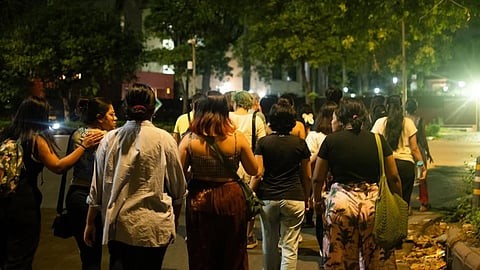
- HOMEGROWN WORLD
- #HGCREATORS
- #HGEXPLORE
- #HGVOICES
- #HGSHOP
- CAREERS
- ABOUT US
- CONTACT US

Across the world, walking alone at night has becomes a perilous gamble for women. The streets after dark morph into battlegrounds of fear, where a woman’s mere presence is policed by unspoken curfews, suspicious glances, and the threat of violence. In a society shaped by patriarchy, the night does not belong to women — it becomes something they must either avoid or survive. When harm befalls them, the onus is placed not on the perpetrator, but on the woman’s clothing, her route, her timing, and even her decision to step out at all. This logic of blame is systemic, and it’s designed to 'discipline' women into silence and submission .
It is in a radical opposition to this that 'Women Walk At Midnight' was born. Founded by theatre artist Mallika Taneja in Delhi, this non-funded initiative invites women to walk through their cities at night with a simple mission: to reclaim space by inhabiting it.
The idea emerged in the aftermath of the 2012 Nirbhaya gang rape and the protests that followed. Mallika, deeply affected by Maya Rao’s performance piece 'The Walk', began exploring the politics and performance of walking — how moving through a city can be a subversive act of endurance, protest, and visibility. In February 2016, a social media call gathered a small group who walked from 10 PM to 4 AM through Delhi. What began as a performance experiment evolved into a sustained practice, rooted in the refusal to be afraid.
The movement has since grown organically. Women Walk At Midnight is now active in Delhi, Faridabad, Bangalore, Cape Town, Kathmandu, and other cities across the world. Each chapter is led by women in the local community, with over 55 walks in Delhi alone. The initiative is open to all who identify as women or were assigned female at birth. Though walking, talking, laughing, and pausing for chai or ice cream, the aim of the collective is to reclaim the night.
At its heart, Women Walk At Midnight is also about reimagining the relationship women have with the city, with walking, and with the night. It insists that these are not just sites of danger, but also of joy, curiosity, and freedom. The walk is neither a fitness activity nor a heritage tour. It’s a form of protest that happens every time a woman dares to enjoy the night without fear. The vision behind the walk is aimed towards building a space for both personal and political action and sharing stories across neighbourhoods and time zones.
The walk here becomes a act of collective resistance: against fear, erasure, and the idea that safety can only come from restriction. It is also an act of tenderness — toward the self, other women, and the possibility of a more equal world. In solidarity with movements like Why Loiter, Girls at Dhabas, Blank Noise, Take Back the Night, and many others, Women Walk At Midnight turns one of the most deeply internalised forms of social control into an emphatic gesture of defiance. In doing so, not only are they reclaiming their agency but shifting the responsibility of safety and shining a spotlight onto those who choose to endanger it instead.
Follow Women Walk At Midnight here.
If you enjoyed reading this here's more from Homegrown:
Sister Library: Inside Aqui Thami's Nurturing Space Of Connection & Empowerment
The Chanakya School Is Helping Indian Women Build Futures Through Craft & Design
A New Indian Book Aims To Spotlight The Fearless Spirit Of Muslim Women Travel Writers
